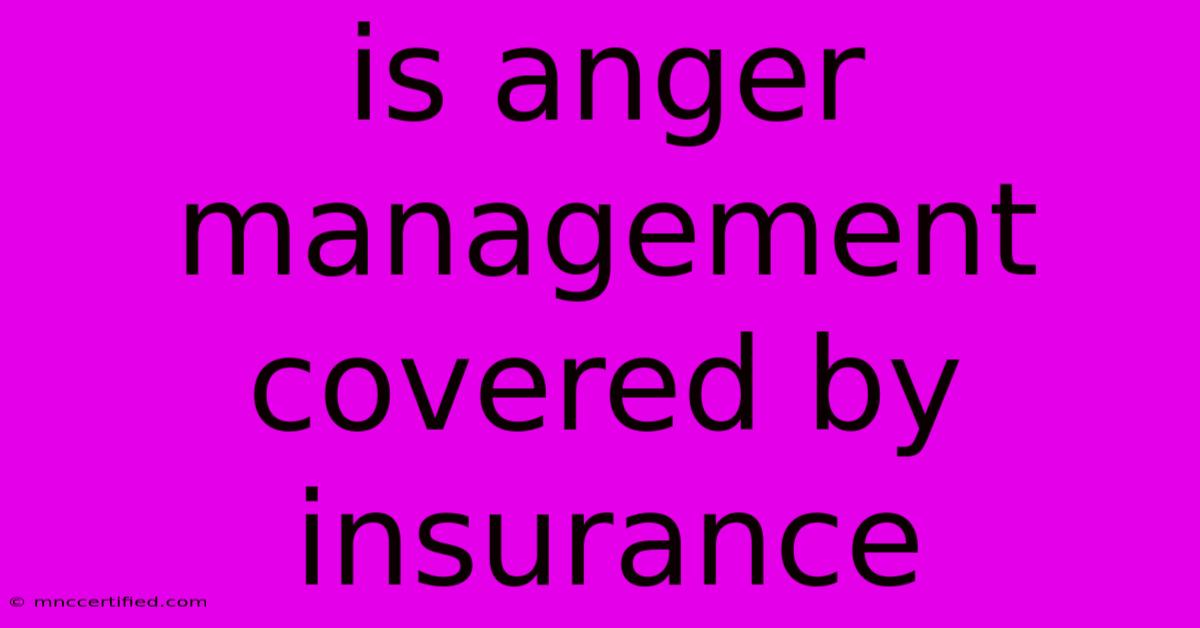Is Anger Management Covered By Insurance

Table of Contents
Is Anger Management Covered by Insurance? A Comprehensive Guide
Anger management is a vital skill for many individuals. It can help improve relationships, reduce stress, and enhance overall well-being. However, the cost of anger management programs can be a barrier for some. This begs the question: Is anger management covered by insurance?
The answer is not straightforward. Insurance coverage for anger management varies depending on several factors:
- Type of insurance: Different insurance plans have different coverage policies. Some plans may cover anger management as a part of mental health services, while others may not.
- Diagnosis: The reason for seeking anger management is also a determining factor. For example, if you are diagnosed with a mental health condition like anxiety or depression, anger management may be covered as part of your treatment plan.
- State regulations: Some states have specific regulations regarding insurance coverage for mental health services, including anger management.
- Specific provider: Even within a particular insurance plan, coverage can vary depending on the specific anger management provider.
Here's a breakdown of how to find out if your insurance covers anger management:
1. Contact Your Insurance Provider
The best way to know for sure is to contact your insurance provider directly. Ask about their coverage for:
- Anger management therapy: This could include individual or group therapy sessions.
- Anger management courses: These are often offered by licensed therapists or mental health professionals.
- Other anger management programs: This might include online programs, workshops, or support groups.
Ask specifically about the following:
- What is your coverage limit for mental health services?
- Do you need a referral from your primary care physician?
- What providers are in your network?
- Are there any pre-authorization requirements?
2. Review Your Policy Documents
Carefully review your insurance policy documents. Look for sections related to mental health services, behavioral health benefits, or substance abuse treatment. These sections may specify coverage for anger management.
3. Consult Your Primary Care Physician
Your primary care physician can also provide information about your insurance coverage for anger management. They may have knowledge about specific providers within your network or can assist in obtaining a referral.
4. Consider Out-of-Pocket Options
If your insurance does not cover anger management, you may need to explore out-of-pocket options. Consider:
- Sliding scale fees: Some therapists offer services on a sliding scale based on income.
- Free or low-cost community resources: Look for local support groups, workshops, or community centers that offer affordable or free anger management programs.
- Online programs: Several online anger management programs are available at varying costs.
Tips for Improving Your Chances of Coverage:
- Obtain a diagnosis: If you have a diagnosed mental health condition, anger management may be covered as part of your treatment plan.
- Seek treatment from in-network providers: This ensures you receive the maximum coverage possible.
- Work with your provider to develop a treatment plan: Explain your needs and ask for their support in navigating insurance coverage.
- Be prepared to advocate for yourself: If your insurance company denies coverage, be prepared to appeal the decision and provide supporting documentation.
Remember: Accessing anger management services can be a crucial step towards managing your emotions effectively. By understanding your insurance coverage and exploring available options, you can take control of your anger and improve your overall well-being.

Thank you for visiting our website wich cover about Is Anger Management Covered By Insurance. We hope the information provided has been useful to you. Feel free to contact us if you have any questions or need further assistance. See you next time and dont miss to bookmark.
Featured Posts
-
Homeowners Insurance For Estate Property
Nov 08, 2024
-
Bardstown Origin Series Bottled In Bond
Nov 08, 2024
-
Equity Derivatives Trading Summer Anayst
Nov 08, 2024
-
North Korean Troops Reportedly Using Porn In Russia
Nov 08, 2024
-
Internet Access In North Korea Early User Reactions
Nov 08, 2024